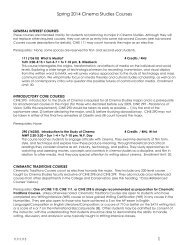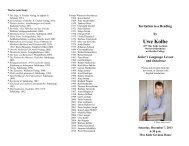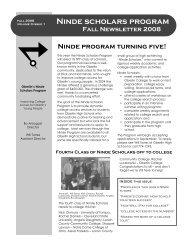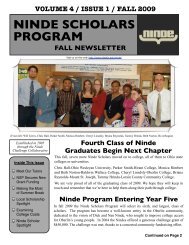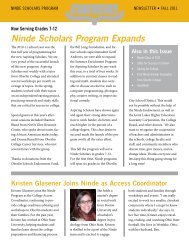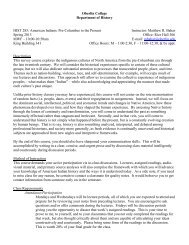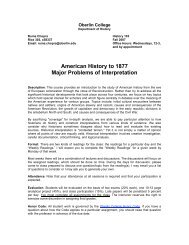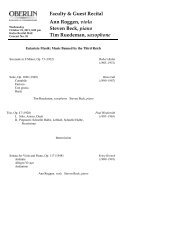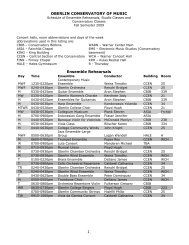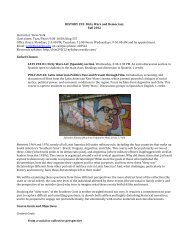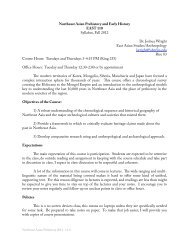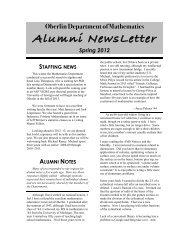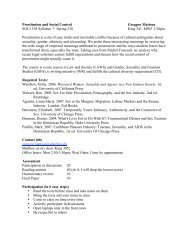Environmental Studies newsletter 2008 - Oberlin College
Environmental Studies newsletter 2008 - Oberlin College
Environmental Studies newsletter 2008 - Oberlin College
You also want an ePaper? Increase the reach of your titles
YUMPU automatically turns print PDFs into web optimized ePapers that Google loves.
Acting Locally: <strong>Oberlin</strong>’s Light Bulb Brigade<br />
Kristin Braziunas ‘08<br />
This past spring semester, <strong>Environmental</strong> <strong>Studies</strong> student groups,<br />
community partners, and volunteers organized the free exchange<br />
of 10,000 new compact fluorescent light bulbs (CFLs) for existing<br />
incandescent bulbs in <strong>Oberlin</strong> <strong>College</strong> and community. The light<br />
bulb donor stipulated that this would be a pilot project and would be<br />
implemented at colleges and universities nationwide contingent upon<br />
<strong>Oberlin</strong>’s success. This program aims to formalize student-run energyefficiency<br />
initiatives and supply the resources they need to make a real<br />
difference in energy use in their local communities.<br />
The Light Bulb Brigade expands the work of Andrew deCoriolis and<br />
Morgan Pitts (both OC ’07), who led a project of the same name in<br />
<strong>Oberlin</strong> dorms last year. Light bulbs are one of the lowest hanging<br />
fruits in energy efficiency, and yet despite the energy and monetary<br />
savings of CFLs, the upfront cost remains a barrier to change. The<br />
Light Bulb Brigade eliminated that initial cost, allowing participants<br />
the opportunity to experiment with energy efficiency without making<br />
an initial investment. To ensure immediate energy savings, students<br />
asked participants to bring in the incandescent bulbs then in their light<br />
fixtures and exchanged on a one-for-one basis.<br />
Students in two sections of Environment and Society (ENVS101) took<br />
on the challenge of organizing exchanges with multiple groups, both<br />
in the <strong>College</strong> and Community. On the first day of the <strong>Oberlin</strong> <strong>College</strong><br />
Employees exchange, in early April, a mob of employees holding plastic<br />
bags and boxes of incandescent bulbs packed the Wilder Student Union<br />
lobby. Over the course of the weeklong exchange, 11 AM to 12 PM<br />
became the “morning rush,” when students could count on nonstop<br />
action serving long lines of faculty and staff waiting to trade in light<br />
bulbs. In all, <strong>Oberlin</strong> employees received and installed 2,500 CFLs in<br />
their homes.<br />
Students employed a variety of efforts to both publicize the program<br />
and exchange bulbs. One ENVS 101 group led exchanges with students,<br />
going door-to-door in dorms offering light bulbs and culminating in<br />
an exchange on Earth Day. Another group worked with <strong>Oberlin</strong> High<br />
School to send home a flyer to parents encouraging them to bring their<br />
bulbs to exchange at parent-teacher conference nights. Some community<br />
members passed the word around that students were coming door-todoor,<br />
and I received phone calls from residents who wanted me to come<br />
through their home and swap out every old, inefficient light bulb we<br />
could find. At one house, we swapped out more than 60 bulbs.<br />
In addition to High School and door-to-door exchanges, two student<br />
groups worked with local churches and community groups to bring<br />
these light bulbs to the larger <strong>Oberlin</strong> Community. Mount Zion Baptist<br />
Church, Rust United Methodist Church, Seventh Day Adventist Church,<br />
Concord Manor, and <strong>Oberlin</strong> Community Services served as venues<br />
for exchanges where local residents, churchgoers, and attendees of<br />
monthly food distributions could either bring in their light bulbs or<br />
sign up to have students bring light bulbs to their door. Downtown<br />
businesses Ben Franklin, Watson’s Hardware, and Main Street <strong>Oberlin</strong>,<br />
exchanged more than 2,500 light bulbs over the course of a week and a<br />
half. Community partners that helped with implementation and publicity<br />
include <strong>Oberlin</strong> Municipal Light and Power System, the <strong>Oberlin</strong> News-<br />
Tribune, Mount Zion Community Development Corporation (CDC),<br />
the Southside Neighborhood Association, the Elyria YWCA, and the<br />
<strong>Oberlin</strong> Heritage Center.<br />
<strong>Oberlin</strong> was the first of its peer institutions to sign the American<br />
<strong>College</strong> and University President’s Climate Commitment. Each of the<br />
now over 530 institutions that have signed this agreement commits to<br />
developing both a budget that accounts for all greenhouse gas emissions<br />
associated with campus<br />
operations and a longterm<br />
plan for balancing<br />
that budget to achieve<br />
“carbon neutrality.”<br />
Among its other benefits,<br />
this semester’s light bulb<br />
exchange is being explored<br />
as a local “carbon offset”<br />
program; some of the oncampus<br />
greenhouse gas<br />
emissions will be balanced Kristin Braziunas ‘08 and John Petersen ‘88<br />
through this and other local<br />
projects that reduce emissions in the larger community. The advantage<br />
of local programs such as the Light Bulb Brigade is that they result in<br />
economic and social benefits within the <strong>Oberlin</strong> community. Rough<br />
initial calculations indicate that the exchange of 10,000 compact<br />
fluorescent bulbs will result in savings of approximately 6,500 tons<br />
of CO2, which can then be credited against this year’s on-campus<br />
emissions. Since <strong>Oberlin</strong> seeks to create a model for others, more<br />
thorough analysis is necessary and is underway.<br />
Every participant in a Light Bulb Brigade exchange filled out a survey<br />
including information on wattage of bulbs exchanged, household size,<br />
and likelihood of purchasing CFLs to replace their incandescent bulbs<br />
had we not offered this program. Many residents signed a consent<br />
form that will allow researchers access to their utility bills before<br />
and after CFL installation. In addition, ten identically designed low<br />
income <strong>Oberlin</strong> homes will participate in a more controlled study of<br />
energy usage over the next three months; five of these homes will be<br />
randomly selected to swap out all of their light bulbs. Professors John<br />
Petersen and Rumi Shammin (<strong>Environmental</strong> <strong>Studies</strong>) and Cindy<br />
Frantz (Psychology) are overseeing this study, the first of its kind, in<br />
collaboration with students living in SEED House. This study will allow<br />
us to more precisely identify real savings of this type of program.<br />
The Brigade officially ended on April 26, when the <strong>College</strong> Recyclers<br />
drove a truck with three 4’ by 4’ by 2’ crates packed full of 8,500<br />
incandescent light bulbs to Wilder Bowl for the Ecolympics closing<br />
ceremony and a photo shoot with President Marvin Krislov. Under the<br />
guidance of local carpenter Nick Zachos, and assisted by Sustainability<br />
Coordinator Nathan Engstrom, Professor John Petersen, and <strong>College</strong><br />
First-Year Maggie Zimmer, student volunteers constructed these boxes<br />
out of plywood and plexiglass, and they will be on display in the AJLC<br />
Atrium through commencement. The collected incandescent bulbs will<br />
then be recycled at <strong>Environmental</strong> Recycling, a facility near Bowling<br />
Green, Ohio.<br />
As the student coordinator of the Light<br />
Bulb Brigade, my duties continue with the<br />
distribution of the remaining 1,500 bulbs,<br />
which have been set aside for the research<br />
study and local communities that were not<br />
reached in the initial push. I will be working<br />
with Mount Zion CDC Executive Director<br />
Judy Wright to ensure that these light bulbs<br />
find their way into <strong>Oberlin</strong> homes where<br />
they are most needed. It has been a long<br />
and rewarding three months, and <strong>Oberlin</strong><br />
comes ever closer to picking all of that<br />
low-hanging fruit.<br />
Judy Wright<br />
This program would not have been possible without the generosity of an<br />
anonymous donor working with General Electric and Sommer Electric.<br />
Within the college, the <strong>Environmental</strong> <strong>Studies</strong> Program, the Office of<br />
<strong>Environmental</strong> Sustainability, and the Bonner Center for Service and<br />
Learning provided additional financial and logistical support.<br />
Page 4 <strong>Environmental</strong> <strong>Studies</strong> Program<br />
Photo: Dale Preston



